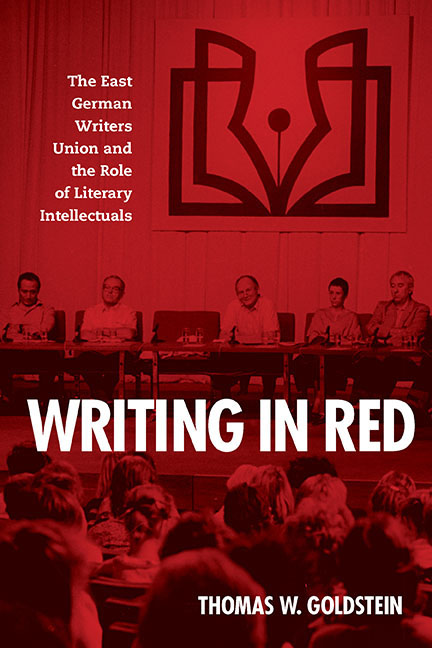Book contents
- Frontmatter
- Contents
- Acknowledgments
- List of Abbreviations
- Introduction
- 1 German Writers Associations through 1970
- 2 Socioeconomic Functions
- 3 The Era of No Taboos? 1971–76
- 4 A Disciplining Instrument, 1976–79
- 5 Defending Peace, Defining Participation, 1979–83
- 6 Years of Resignation, 1983–85
- 7 Glasnost in the GDR? 1985–89
- 8 Coming Full Circle, 1989–90
- Conclusion
- Notes
- Bibliography
- Index
4 - A Disciplining Instrument, 1976–79
Published online by Cambridge University Press: 24 August 2019
- Frontmatter
- Contents
- Acknowledgments
- List of Abbreviations
- Introduction
- 1 German Writers Associations through 1970
- 2 Socioeconomic Functions
- 3 The Era of No Taboos? 1971–76
- 4 A Disciplining Instrument, 1976–79
- 5 Defending Peace, Defining Participation, 1979–83
- 6 Years of Resignation, 1983–85
- 7 Glasnost in the GDR? 1985–89
- 8 Coming Full Circle, 1989–90
- Conclusion
- Notes
- Bibliography
- Index
Summary
HERMANN KANT PROBABLY NEVER IMAGINED that he, a man of fifty and vice president of the Writers Union, would ever stand in front of one hundred twenty fellow writers and cry. Yet that was exactly what he did on November 26, 1976, at the SED base organization meeting within the union's Berlin district branch. They were meeting for the second time in four days, a frequency that underscored the urgency of the situation. The purpose was to deal with criticism of the SED's actions against Wolf Biermann, the popular songwriter who had had his East German citizenship revoked ten days earlier. The ensuing “Biermann Affair” quickly became the most controversial cultural-political event in Honecker's tenure, especially in the literary community. Within days, dozens of intellectuals, including six members of the Berlin branch steering committee, had signed a petition demanding the SED reverse its decision. Penned by Stephan Hermlin, it was first presented to Neues Deutschland but within hours was also distributed to the Western media. Scarcely a week after the petition's publication and after much consultation with local and national Party leaders, the SED's Berlin base organization in the union demanded that the signatories appear at a two-part meeting (November 23 and 26) of all local Party members.
Kant had been away for the first meeting but returned in time for the second. Afraid he had been too lenient in an earlier public statement, he now spoke more sharply, lecturing, “We all have experienced our injustices. I know what I'm talking about!;” He then reached the rub: “I thought we manage certain adversities among ourselves!;” he exclaimed, reminding his listeners that what writers had achieved “[they had]n't accomplished by calling anyone in, but [through] [their] own intelligence, [their] own reason, [their] own courage, and [their] comrades in different areas who [could] help [them].” This was the only way to do things: he stated: “Through this we have achieved something and through nothing else!;” He then addressed the petition's author, his dear friend Hermlin. When Kant learned of his actions, he had felt ashamed, and when he returned home he quickly telephoned Henniger to find out if Hermlin had recanted. He related his reaction to the news: “And I'll tell you what—you can brush it aside, can forget it—but I was excessively happy that….”
- Type
- Chapter
- Information
- Writing in RedThe East German Writers Union and the Role of Literary Intellectuals, pp. 97 - 125Publisher: Boydell & BrewerPrint publication year: 2017



